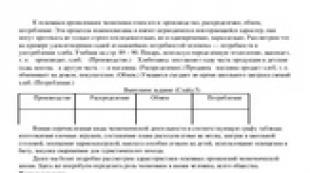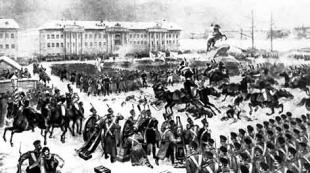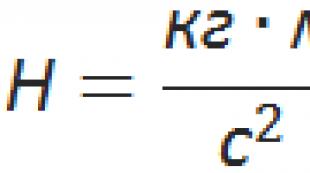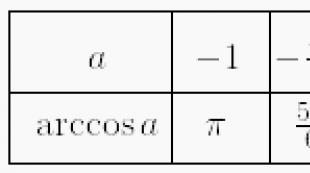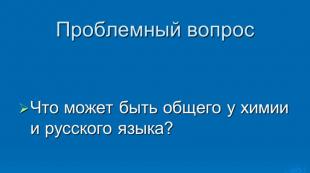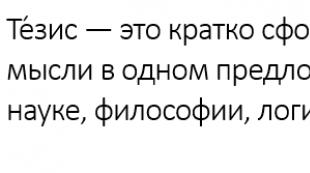A very brief biography of Ryleev. Kondraty Fedorovich Ryleev (short biography). Interesting facts about Ryleev
Kondraty FedorovichRyleev- Decembrist and poet. Born into a seedy noble family on September 28, 1795. His father, who managed the affairs of Prince Golitsyn, was a tough man and treated arbitrarily both his wife and his son. Mother, Anastasia Matveevna (née Essen), wanting to save the child from a cruel father, sent him to the first cadet corps when Kondraty was only six years old. In 1814, Ryleev became an officer of horse artillery and participated in a campaign in Switzerland, in 1815 in France. In 1818 he retired.
In 1820, Kondraty Ryleev married Natalya Mikhailovna Tevyashova and moved to St. Petersburg. First heSettledto the position of judge, and became known for his incorruptible honesty, and soon discovered two talents in himself: poetic and commercial. He joined a Russian-American trading company and fell in love with the United States, seeing it as a model of a free state. He was the first to publish a literary magazine ("Polar Star"), which gave writers and poets decent fees. At the same time, Ryleev wrote his "Dumas", in which, inspired by Karamzin, he tried to sketch poetic images of the brightest personalities of Russian history. Then he released the poem "Voinarovsky", highly appreciated by Pushkin. This poem is remarkable in that in it he described exactly those places where, a few years later, his Decembrist friends had to serve their exile.
In St. Petersburg, Ryleev met many conspirators, recognized in them the same poetic, blind and naive thirst for freedom and became, in his own words, "the spring of the conspiracy."He really became the soul, inspirer and singer of the uprising. He dispelled any sober doubts of his associates with sometimes illogical, but firm arguments. He calmly and at the same time relentlessly convinced one, another, a third that Russia was all infected with evil, that nothing was left alive in it, that debauchery, bribery, injustice were everywhere. Everywhere the temporary worker Arakcheev rules, whose image for Ryleev was a mythical fusion of all the most vile features of the "despotism" he hated. Russia is groveling in darkness, and the only way out of this darkness is a coup. It is necessary to start, Ryleev believed, and then people will see the rightness of the work begun and pick up the baton. Russia will be turned upside down, and out of this chaos the goddess of freedom will be born, who will illuminate her beloved fatherland with a new light.
Nikolai Pavlovich could not decide to ascend the throne, and Konstantin Pavlovich refused the kingdom, the conspirators realized that he turned out to be the one and onlymoment. It was decided to spread rumors among the soldiers that they were being deceived, that Constantine did not abdicate the throne at all, that the deceased tsar left a will in which the soldiers' service life was reduced and the peasants were given freedom. Ryleyev surrendered himself entirely to revolutionary exaltation. He knew that most likely their cause was doomed to failure, but some fate drew him to the square, he saw himself as a sacrifice made for the liberation of mankind. "Yes, there are few prospects for success," he said, "but all the same, it is necessary, all the same, it is necessary to start." And a few months before that, in his Confession of Nalivaiko, Ryleev wrote: “I know: death awaits / The one who rises first / Against the oppressors of the people; / Fate has already doomed me. / But where, tell me, when was / Freedom redeemed without sacrifice ?"
On the same night, Ryleev said goodbye to his wife. With all the strength of a suffering woman's heart, she held him back. “Leave my husband to me, don’t take him away, I know that he is going to his death,” she repeated, referring to Ryleev’s friends. But everything was already decided. Nothing could change even the sobs of a five-year-old daughter, who hugged her father's knees, peering into his concentrated face with her clear, piercing, tear-filled eyes. Ryleev escaped from his daughter's arms, laid his almost unconscious wife on the sofa and ran out after Nikolai Bestuzhev, who many years later captured this scene in his memoirs.

And by the evening of the same day, it was all over. The raging commoners were still walking in groups, the last traces of the insane jealousy of the noble revolutionaries were still being removed from the square, Karamzin and his three sons were still wandering the twilight streets of St. power. And Ryleev returned home. Something collapsed forever in his soul, some new voice began to sound muffled in it. Conscience spoke. “They didn’t do well, all of Russia was ruined,” he said after returning from the square.

And soon he and most of the other Decembrists were in the Peter and Paul Fortress. It is known how cowardly they gave each other away, how zealous they were in exposing, how easily the foundations of all their theoretical constructions crumbled before the horror of prison and power. Ryleev, from the first days of his imprisonment, began to feel the ever-growing voice of the higher forces of the soul, a voice calling a person to the eternal, mountainous, not subject to the laws of earthly life. If before that he always thought about the kingdom of justice here on earth, and not outside the tomb, now he looked more and more seriously into the face of Christ, who suffered for people and called them to the incomprehensible Kingdom of Heaven. It is impossible for us to trace exactly how and with what speed this revolution took place in the soul of the prisoner. But the completed rebirth is obvious. Nestor Kotlyarevsky, a pre-revolutionary researcher of Ryleev's life and work, writes that "by the end of his imprisonment, he did not have a trace of a revolutionary spirit left."
This is best evidenced by the wonderful letters of Kondraty Fedorovich to his wife. All of them are permeated with one thing: confidence in the goodness and mercy of Providence. The king for him is no longer an autocratic despot, but the spokesman of this will. “Rely on the Almighty and the mercy of the sovereign,” Ryleev writes many times from the fortress. Anticipating the impending execution, he in no way considers it cruel or unfair and appeals to his wife: "Whatever befalls me, accept everything with firmness and obedience to His (God. - T.V.) holy will." Shocked by the royal mercy (Nikolai sent his wife 2 thousand rubles, and then the empress sent a thousand rubles for her daughter's name day), Ryleev, with all the strength of the Russian soul, surrenders to the feeling of love and gratitude to the royal family. "Whatever happens to me," he says, "I will live and die for them." (It should be noted that the tsar continued his concern for the Ryleyev family, and his wife received a pension until her second marriage, and his daughter until adulthood.) Ryleyev also says that "to this day he is treated not as a criminal, but as with the unfortunate. And seeing the merit of the tsar in this, he writes to his wife: "Pray, my friend, may he (the tsar. - TV) have in his close friends of our dear fatherland and may he make Russia happy with his reign."
Ryleev thanks fate for what happened to him. “Having spent three months alone with myself,” he writes to his wife, “I got to know myself better, I examined my whole life and clearly saw that I was mistaken in many ways. I repent and thank the Almighty that He opened my eyes. was, I will not lose as much as I gained from my misfortune, I only regret that I can no longer be useful to my fatherland and to a sovereign so merciful. With bitterness, Ryleev feels terrible guilt before his family. There is only one consolation left for him: to fervently pray for his wife and daughter. “My dear friend,” he writes, “I am cruelly guilty before you and her (daughter. - T.V.): forgive me for the sake of the Savior, to whom I entrust you every day: I confess to you frankly, only during prayer do I calm for you. God is just and merciful, he will not leave you, punishing me. "
Shortly before the execution, Ryleev draws up a note addressed to Nikolai. In it, he renounces "his delusions and political rules" and motivates this renunciation by the fact that his spirit discovered the world of the Christian faith and now everything appeared to him in a new light, and he "with the holy gift of the Savior of the world was reconciled with his Creator." In this note, he does not ask for pardon, recognizes his execution as deserved and "blesses the punishing right hand", but prays for only one thing: "Be merciful to the comrades of my crime." Ryleev puts the main blame on himself, arguing that it was he who "with his criminal jealousy was a disastrous example for them" and because of him "innocent blood was shed."
On the night before the execution, Kondraty Fedorovich was meek and quiet. The priest Father Pyotr Smyslovsky came, who for more than half a year was, in the words of the prisoner himself, "his friend and benefactor." The priest gave communion to the condemned. In the predawn hours, Ryleev wrote his last letter to his wife: “God and the sovereign have decided my fate: I must die and die a shameful death. May His holy will be done! My dear friend, surrender yourself to the will of the Almighty, and He will console you. For the soul pray to God. He will hear your prayers. Do not grumble either at Him or at the sovereign: it will be both reckless and sinful. Can we comprehend the inscrutable ways of the Incomprehensible? I never grumbled during my imprisonment, and for that the Holy Spirit is wondrous consoled me. Marvel, my friend, and at this very moment, when I am busy only with you and our little one, I am in such comforting calmness that I cannot express to you. Oh, dear friend, how saving it is to be a Christian ... "It was already dawning, footsteps and voices were heard outside the doors, Ryleev was finishing the last words of his last letter: "Farewell! They are ordered to dress. May His holy will be done."

In the early morning of July 13 (25), 1826, a small crowd of people gathered on one of the St. Petersburg embankments. The faces were concentrated and gloomy, the rising sun illuminated the bodies of the executed. The case was unprecedented for Russia. Since the time of Pugachev, executions have not been known here. The gallows was made awkwardly, too high, and the school benches had to be carried from the adjacent Merchant Shipping School. The ropes were picked up for a long time, but they could not find suitable ones. Three of the executed broke. The executioners themselves took pity on the criminals, who, raising their hands to heaven, prayed before death, kissed the priest's cross and ascended the scaffold, which became for them a step towards incomprehensible eternity.
This execution of Pavel Pestel, Sergei Muravyov-Apostol, Kondraty Ryleev, Mikhail Bestuzhev-Ryumin and Pyotr Kakhovsky and the tragic events that preceded it gave one of the most terrible cracks in our history. The tsar, who ascended the throne against his will, met the enemies of his state in the person of the most talented, noble and educated youth, and throughout his reign he could not get rid of deep doubts about the good intentions of the noble society, and society, in turn, was still muffled. and secretly, but more and more stood up in opposition to the Russian historical system.
Understanding all the real criminality of our first revolutionaries, recognizing the deeply negative consequences of their actions, one cannot, however, not be interested in their contradictory and strange fates. Looking into the depths of these souls, ardent and poetic, but agitated to the extreme by the spirit of the times, one can sometimes discover amazing pearls. And the words spoken about the Decembrists by the priest Peter Smyslovsky, who confessed them in the fortress, seem deeply true. “They are terribly guilty,” he said, “but they were mistaken, and they were not villains! Their guilt came from the delusions of the mind, and not from the corruption of the heart. Lord, let them go! They didn’t know what they were doing. Here is our mind! get lost? And delusion leads to the brink of destruction."
Kondraty Fyodorovich Ryleev was born on September 18, 1795 in a poor noble family. His father, managing director of Prince. Golitsyn, was a stern and despotic man. Ryleev's mother, Anastasia Mikhailovna Essen, gave the child to the first cadet corps in order to save the boy from abuse. Interest in poetry awakened in Ryleyev quite early. Almost his first poetic experience was the comic ("heroic-comic") poem "Kulakiyada", describing the death and campaigns of the corps cook Kulakov and exposing in a humorous form the housekeeper Bobrov, who left a peculiar mark in the history of the corps. In 1814, Ryleev was promoted to officer, horse artillery, and went to the active army. In the spring of 1817 he returned to Russia, retired, entered the civil service. After marrying N.M. Tevyasheva moved to St. Petersburg, joined the Free Society of Lovers of Russian Literature and the Flaming Star Masonic lodge. In 1821, Ryleev was elected from the nobility as an assessor of the criminal chamber and gained some popularity as an incorruptible champion of justice. Since 1824, Ryleev (on the recommendation of N.S. Mordvinov) - the head of the office of the Russian-American company, is a member of its shareholders.
1820s - the time of active literary activity of K.F. Ryleeva. From the very arrival in the northern capital, he begins to be published in the Nevsky Spectator, the Well-Meaning. Since 1823, together with A. Bestuzhev, he has been publishing the almanac "Polar Star". In 1826, the publishers planned Zvezdochka (an almanac of a smaller volume), but it was published only in 1870 (in Russkaya Starina). In 1824-1825. he publishes “Dumas” (historical paintings in verse), the poems “Voynarovsky” and “Nalivaiko”. But already the first printed work of Ryleev - "To the temporary worker" (1820) made his name widely known.
At the beginning of 1823, Ryleev joined the Northern Society, and a year later he was its actual head.
In his apartment was the headquarters for the preparation of the uprising. On the eve of December 14, there was a meeting of future participants in the uprising in Ryleev's house. “How beautiful Ryleev was that evening,” recalled Mikhail Bestuzhev. - He was not good-looking, he spoke simply, but not smoothly, but when he got on his favorite topic - love for the motherland, his physiognomy revived, his pitch-black eyes lit up with an unearthly light, his speech flowed smoothly, like fiery lava, and then, it happened, you won’t get tired of admiring it.”
After the failure of the uprising, in anticipation of the imminent arrest, Ryleev destroyed all documents related to the activities of the secret society. He gave part of the literary archive to F.V. Bulgarin. Manuscripts of poems, sketches of poems and tragedies, personal correspondence - all these documents ended up in the commission of inquiry, and then all this "Ryleevsky archive" under unclear circumstances ended up in the Saratov province; and only at the end of the XIX century. it has been partially published.
Ryleev was sent to the Peter and Paul Fortress with the following instruction from Nicholas I: “... Put him in the Alekseevsky ravelin, but without tying his hands, without any communication with others, give him paper for writing, and bring me daily what he will write to me with his own hand. ". The months spent in the fortress are a tragic and difficult period in the poet's life. He was oppressed by a constant sense of guilt towards the comrades whom he had led to death, and he admitted that he was "the main culprit in the incident on December 14." In the list of criminals, Ryleev was ranked second: “he intended to commit regicide ... to deprive him of liberty and exterminate the royal family ... strengthened the activities of the Northern Society, managing it, prepared ways for a rebellion ... he himself composed and distributed outrageous songs and poems, inciting to rebellion of the lower ranks ... during the rebellion he himself went to the square ... "
On July 13, 1826, 5 Decembrists were executed by hanging. But Ryleev, Kakhovsky and Muravyov had to go through the execution twice - the ropes could not withstand the weight of the shackles put on the Decembrists. An unprecedented thing in history - they were hanged a second time, although the one who broke off the noose was worthy of forgiveness.
Konstantin Fedorovich Ryleev is one of the most famous Russian writers, as well as a member of the Decembrist movement.
Ryleev was the son of a nobleman who owned an estate in the province of St. Petersburg. Konstantin Fedorovich received his education in the 1st Cadet Corps of this city. After the corps, Ryleev became an officer in an artillery regiment and took part in the foreign campaigns of the Russian army in the period 1814-1815. Rumor has it that in Paris Ryleev once visited a fortune teller who predicted that he would be hanged.
In 1819, the poet marries for love the daughter of a wealthy landowner, moves to live in St. Petersburg, where he begins to work in court. Ryleev's contemporaries were liberal, but the poet himself tried to ennoble the civil service, to show its benefits and good for the people. While serving in court, he helped a lot to ordinary and disadvantaged people. In the spring of 1824, Ryleev moved to a state-owned house on the Moika, because now he works as a secretary of the American - Russian office.
Ryleev in literature
Ryleev's work was characterized by patriotism, a romantic mood, the equality of people, he highly valued ordinary Russian citizens. In his political views, the poet was a pronounced romantic and utopian. The poet's colleagues recalled that he advocated equality and was a dissident. These motifs were central to his work.
Ryleev was not an aesthete in poetry and sang of simple human virtues ("I am not a poet, I am a citizen"), the author's heroes were tireless fighters for freedom. In 1819, he began to be published in various publications, but most of all he became famous for the poem "To the temporary worker", where he explicitly denounced A. A. Arakcheev. Ryleev is the author of the collection "Duma", where he tells in verse events from Russian history, and the thought about "Ermak" later became a folk song, he also writes the poems "Voynarovsky", "Nalivaiko". He was a member of the free Society of Lovers of Literature, the Society of Competitors of Education and Charity. From 1823 to 1825, the poet, together with his friend, poet and Decembrist A. A. Bestuzhev, published the popular literary almanac "Polar Star", in which they printed the works of A. S. Pushkin, P. A. Vyazemsky, A. A. Delvig and others.
At the end of 1823, Pushchin accepted Ryleev into the Northern Society, the poet quickly becomes its activist. And from the end of 1824, Ryleev actually began to head the Northern Society. In his views and convictions, Ryleev advocated that Russia become a republic without a constitutional monarchy, but he did not participate in disputes with the Decembrists on this matter. Ryleev believed that the people themselves, with the help of the Constituent Assembly, should decide the fate of Russia, who and how would govern it. And the task of the Decembrists is only to achieve the convocation of such a meeting. The poet also offered to humanely eliminate the royal family - with the help of the navy, take her to distant lands. Ryleev made an attempt to establish a branch of the Northern Society in Kronstadt, but it failed.
In February 1824, Prince K. Ya. Shakhovsky wounded Ryleev in a duel. Ryleev challenged the prince to a duel, standing up for his sister's honor. In September 1825, Ryleev accepted the request of his cousin K. P. Chernov to become his second in the later noisy duel with V. D. Novosiltsev. Both participants died in the duel.
Tsar Alexander the First dies next, which takes the members of the Northern society by surprise, who seek to avoid rumors about the assassination of the tsar and decide to make a revolution at the time of his death. Ryleyev himself became the initiator and personally prepared an uprising on Senate Square on December 14, 1825.
In those days, when the new tsar had not yet ascended the throne, Ryleyev had a sore throat, but he held meetings of the society at his home. His comrades came under the pretext of visiting the sick. The poet had inspiring conversations with his comrades, but he personally could not participate in the uprising, because he was a civilian. On December 14, Ryleev was at Senate Square. But soon he left and traveled around the city all day, trying to find support in the regiments and learning about new events. On the same day in the evening, Konstantin Ryleev was arrested. He was sentenced to death and hanged on July 13, 1826. He left behind a wife with two small children.
We draw your attention to the fact that the biography of Ryleev Kondraty Fedorovich presents the most basic moments from life. Some minor life events may be omitted from this biography.
The word "Decembrists" in the minds of many people is associated with noble and selfless daredevils who, despite their noble origin, went against high society, that is, the society to which they themselves belonged. So the biography of Ryleev Kondraty Fedorovich - one of the leaders - is evidence of his selfless struggle for justice and the rights of ordinary people.
Childhood and youth of the poet
On September 18, 1795, Ryleev Kondraty Fedorovich was born into an impoverished noble family. His father, who served as a manager, was a man with a strong temper and behaved like a real despot in relation to his wife and son. Anastasia Matveevna - Ryleev's mother, wanting to save her little son from his father's cruel treatment, was forced to send him at the age of six (in 1801) to be raised in the first cadet corps. It was here that the young Kondraty Ryleev discovered his strong character, as well as his talent for writing poetry. In 1814, a 19-year-old cadet became an officer, and he was sent to serve in horse artillery. In the first year of his service, he went on campaigns in Switzerland and France. Kondraty Fedorovich ended his military career after 4 years, having retired in 1818.
Kondraty Fedorovich Ryleev. Biography of an aspiring rebel poet
In 1820, after marrying Natalya Tevyashova, Ryleev moved to St. Petersburg and became close to the capital's intellectual circles. He becomes a member of the free society of lovers of Russian literature, and he was also interested in the Flaming Star Masonic lodge. The literary activity of the future revolutionary begins in the same period. He publishes his works in several St. Petersburg publications. The unheard-of audacity and courage of the poem "To the temporary worker" struck Ryleev's friends, because it aimed at General Arakcheev himself. The young rebel poet acquired a reputation as an incorruptible champion of justice when he received the position of assessor of the criminal chamber. The biography of Ryleev Kondraty Fedorovich, concerning the first years of his life in the capital, contains data on his friendship with many famous literary figures of that time: Pushkin, Bulgarin, Marlinsky, Speransky, Mordvinov and others.

Ryleev: "I'm not a poet, but a citizen"
A literary society often gathered in the Ryleevs' house, and at one of these meetings, in 1823, Ryleev and Marlinsky (A. A. Bestuzhev) came up with the idea of issuing the annual almanac Polar Star, which became the predecessor of the Moscow Telegraph newspaper. At the same time, the poem "Voinarovsky" and the famous patriotic ballads "Duma" by Ryleev were published. The poet becomes a member of the revolutionary Northern Society, and a year later he is elected leader of this society.

Sunset
Since that time, the biography of Ryleev Kondraty Fedorovich is completely devoted to his revolutionary activities. After the legendary revolutionary poet was arrested and imprisoned in a fortress. During interrogations, he behaved calmly and took responsibility for organizing the uprising. Ryleev became one of the five Decembrists sentenced to death. The revolutionary heroes were hanged on July 13, 1826. Unfortunately, the biography of Ryleev Kondraty Fedorovich is very short, because he lived only 31 years. However, his life was bright and eventful and completely devoted to civil service and
Kondraty Fyodorovich Ryleev. Born on September 18 (September 29), 1795 in the village of Batovo, St. Petersburg province - executed on July 13 (July 25), 1826 in the Peter and Paul Fortress (St. Petersburg). Russian poet, public figure, Decembrist.
Kondraty Ryleev was born on September 18 (September 29 according to the new style) in 1795 in the village of Batovo, St. Petersburg province (now the territory of the Gatchina district of the Leningrad region).
Father - Fyodor Andreevich Ryleev (1746-1814), manager of the estate of Princess Varvara Golitsyna, a small estate nobleman.
Mother - Anastasia Matveevna Essen (1758-1824).
In 1801-1814 he studied at the St. Petersburg First Cadet Corps. Participated in foreign campaigns of the Russian army in 1813-1814.
In 1818 he retired.
From 1821 he served as an assessor of the St. Petersburg Criminal Chamber, from 1824 - the head of the office of the Russian-American Company.
In 1820 he wrote the famous satirical ode "To the temporary worker" (see below).
In 1823-1825, Ryleev, together with Alexander Bestuzhev, published the annual almanac "Polar Star". He was a member of the St. Petersburg Masonic Lodge "To the Flaming Star".
Ryleev's thought "The Death of Yermak" (see below) was partially set to music and became a song.
Appearance of Kondraty Ryleev: “He was of medium height, good build, his face was round, clean, his head was proportional, but the upper part of it was somewhat wider; his eyes are brown, somewhat bulging, always watery... being somewhat short-sighted, he wore glasses (but more so when he was studying at his desk).”

In 1823 he became a member of the Northern Society of Decembrists, then heading its most radical wing. At first, he stood on moderate constitutional-monarchist positions, but later became a supporter of the republican system.
On September 10, 1825, he acted as a second in the duel of his friend, cousin, lieutenant K. P. Chernov and the representative of the aristocracy of the aide-de-camp V. D. Novosiltsev. The cause of the duel was a conflict due to prejudices associated with the social inequality of the duelists (Novosiltsev was engaged to Chernov's sister, Ekaterina, but under the influence of his mother, he decided to refuse marriage, thereby disgracing the bride and her family). Both participants in the duel were mortally wounded and died a few days later. Chernov's funeral resulted in the first mass demonstration organized by the Northern Society of Decembrists.
Ryleev (according to another version - V.K. Kuchelbeker) is credited with the free-thinking poem "I swear on honor and Chernov." He was one of the main organizers of the uprising on December 14 (26), 1825. While in the fortress, he scratched on a tin plate, in the hope that someone would read his last verses:
“Prison is in honor of me, not in reproach,
For a just cause, I'm in it,
And should I be ashamed of these chains,
When I wear them for the Fatherland!
Correspondence with Ryleev and Bestuzhev, concerning mainly literary matters, was of a friendly nature. It is unlikely that Ryleev’s communication with him was also politicized - if both called each other “republicans”, then, rather, because of their belonging to the FOLRS, also known as the “Academic Republic”, than for any other reasons.
During the life of Kondraty Ryleev, two of his books were published: in 1825 - "Dumas", and a little later in the same year the poem "Voinarovsky" was published.
It is known how Pushkin reacted to Ryleev's "Dums" and - in particular - to "Oleg the Prophet". “They are all weak in invention and presentation. All of them are of the same cut: they are made up of common places (loci topici) ... a description of the scene, the speech of the hero and moralizing, ”Pushkin wrote to K. F. Ryleev. “There is nothing national, Russian in them, except for names.”
In 1823, Ryleev made his debut as a translator - a free translation from the Polish poem by Y. Nemtsevich "Glinsky: Duma" was published in the printing house of the Imperial Educational House.
In preparing the uprising on December 14, Ryleev played one of the leading roles. While imprisoned, he took all the blame on himself, sought to justify his comrades, placed vain hopes on the mercy of the emperor for them.
Kondraty Ryleev was executed by hanging on July 13 (25), 1826 in the Peter and Paul Fortress among the five leaders of the December uprising, along with,. His last words on the scaffold, addressed to the priest P. N. Myslovsky, were: "Father, pray for our sinful souls, do not forget my wife and bless my daughter." Ryleev was one of the three whose rope broke. He fell into the scaffold and some time later was hanged again.
According to some sources, it was Ryleev who said before his second execution: "Unfortunate country where they don't even know how to hang you"(sometimes these words are attributed to P.I. Pestel or S.I. Muravyov-Apostol).
The exact burial place of K. F. Ryleev, like other executed Decembrists, is unknown. According to one version, he was buried along with other executed Decembrists on Goloday Island.
After the Decembrist uprising, Ryleyev's publications were banned and mostly destroyed. There are known handwritten lists of Ryleev's poems and poems, which were distributed illegally on the territory of the Russian Empire. The Berlin, Leipzig and London editions of Ryleev, undertaken by the Russian emigration, in particular Ogarev and Herzen in 1860, were also illegally distributed.
N.P. Ogaryov wrote a poem "In memory of Ryleev".
Decembrist Kondraty Ryleev
Personal life of Kondraty Ryleev:
In 1820 he married Natalya Mikhailovna Tevyasheva, from a Russian noble family, her ancestors were from the nobility of the Golden Horde.
Bibliography of Kondraty Ryleev:
1857 - Poems. K. Ryleeva;
1860 - Ryleev K. F. Duma. Poems. With a preface by N. Ogaryov;
1862 - Ryleev K. F. Poems. With a biography of the author and a story about his treasury;
1872 - The writings and correspondence of Kondraty Fedorovich Ryleev. Edition of his daughter. Ed. P. A. Efremova;
1975 - Ryleev K. F. Dumy (Edition prepared by L. G. Frizman)
To the temporary worker
(Imitation of the Persian satire "To Rubellius")
An arrogant temporary worker, and vile and treacherous,
The monarch is a cunning flatterer and an ungrateful friend,
Furious tyrant of his native country,
A villain elevated to an important rank by tricks!
You look at me with contempt
And in your menacing gaze you show me your furious anger!
I don't value your attention, scoundrel;
From your mouth, blasphemy - a crown worthy of praise!
I laugh at your humiliation!
Can I be humbled by your neglect,
Kohl himself with contempt I look at you
And I'm proud that I don't find your feelings in myself?
What is this cymbal sound of your instant glory?
That the power is terrible and your dignity is majestic?
Oh! better hide yourself in obscurity simple,
Than with low passions and mean soul
Himself, for the strict gaze of his fellow citizens,
Put them on trial, as if for shame!
When in me, when there are no direct virtues,
What is the use of my dignity and my honors?
Not a dignity, not a family - only dignity is respectable;
Seyan! and the very kings without them are contemptible;
And in Cicero I am not a consul - he himself is honored,
For the fact that they saved Rome from Catiline ...
O husband, worthy husband! why can't you again
Having been born, to save fellow citizens from evil fate?
Tyrant, tremble! he can be born
Or Cassius, or Brutus, or Cato, the enemy of kings!
Oh, how on the lyre I will try to glorify him,
Who will save my fatherland from you!
Under hypocrisy you think maybe
To hide from the gaze of the common cause of evil...
Unaware of my terrible situation,
You are deluded in an unfortunate blindness;
No matter how you pretend and no matter how cunning you are,
But the properties of evil souls cannot be hidden:
Your deeds will expose you to the people;
He will know - that you have constrained his freedom,
Tax burdensome brought to poverty,
Villages deprived them of their former beauty...
Then tremble, O haughty temporary worker!
The people are terribly furious with tyrannies!
But if evil fate, falling in love with the villain,
From a fair reward and save you,
All tremble, tyrant! For evil and perfidy
Your offspring will pronounce their sentence!
Death of Yermak
P.A. Mukhanov
The storm roared, the rain roared;
Lightning flew in the darkness
Thunder rumbled incessantly
And the winds raged in the wilds...
To the glory of passion breathing,
In a country harsh and gloomy,
On the wild bank of the Irtysh
Yermak sat, engulfed in thought.
Companions of his labors,
Victories and loud-sounding glory,
Among the spread tents
They slept carelessly near the oak forest.
“Oh, sleep, sleep,” the hero thought, “
Friends, under a roaring storm;
With the dawn, my voice will be heard,
Calling for glory or death!
You need rest; sweet Dreams
And calm the brave in a storm;
In dreams he will remind glory
And the strength of the warriors will double.
Who did not spare his life
In robberies, mining gold,
Will he think about her
Dying for holy Rus'?
Wash away with your own and enemy's blood
All the crimes of a wild life
And deserved for the victory
Blessings of the motherland, -
We cannot be afraid of death;
We have done our work:
Siberia conquered the king
And we - not idly in the world lived!
But his fatal destiny
Already sat next to the hero
And looked with regret
At the victim with a curious look.
The storm roared, the rain roared,
Lightning flew in the darkness;
Thunder rumbled incessantly
And the winds raged in the wilds.
The Irtysh boiled in steep banks,
Gray waves were rising
And crumbled with a roar to dust,
Biya on the shore Cossack boats.
With the leader, peace in the arms of sleep
The brave squad ate;
There is only one storm with Kuchum
I didn’t doze off at their death!
Fearing to fight with the hero,
Kuchum to the tents, like a despicable thief,
Sneaked through the secret path
Tatars surrounded by crowds.
Swords flashed in their hands -
And the valley bled
And fell formidable in battles,
Without drawing their swords, squad ...
Yermak woke up from sleep
And, death in vain, tends to the waves,
Heart full of courage
But the boats are far from the shore!
Irtysh is more worried -
Yermak strains all his strength
And with his mighty hand
Shafts gray cuts ...
Floats ... the shuttle is already close -
But the strength of fate yielded,
And, boiling more terrible, the river
The hero was swallowed up with a bang.
Depriving the strength of the hero
Fight the raging wave
Heavy shell - the gift of the king -
Became his death to blame.
The storm roared... suddenly the moon
The boiling Irtysh turned silver,
And the corpse, vomited by the wave,
In the copper armor lit up.
The clouds rolled in, the rain roared,
And the lightning still flashed
And the thunder still rumbled in the distance,
And the winds raged in the wilds.
